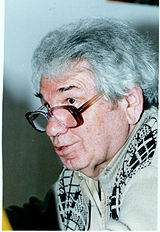This article needs additional citations for verification .(July 2010) |

Michael (Mishe) Lev (3 July 1917 - 23 May 2013) was a Yiddish language writer from Podolia.
This article needs additional citations for verification .(July 2010) |

Michael (Mishe) Lev (3 July 1917 - 23 May 2013) was a Yiddish language writer from Podolia.
Lev was born in Pohrebysche, [1] Ukraine. He studied Yiddish language and literature in Moscow, and worked at a Yiddish publishing house, where his first publications appeared. During World War II Lev fought in the Soviet army, was taken prisoner, escaped, and joined the partisans. [1] His wartime experiences became the main theme of his writings. He published 17 books in Yiddish, Russian and Hebrew. [2] He died, aged 95, in Rehovot, Israel.